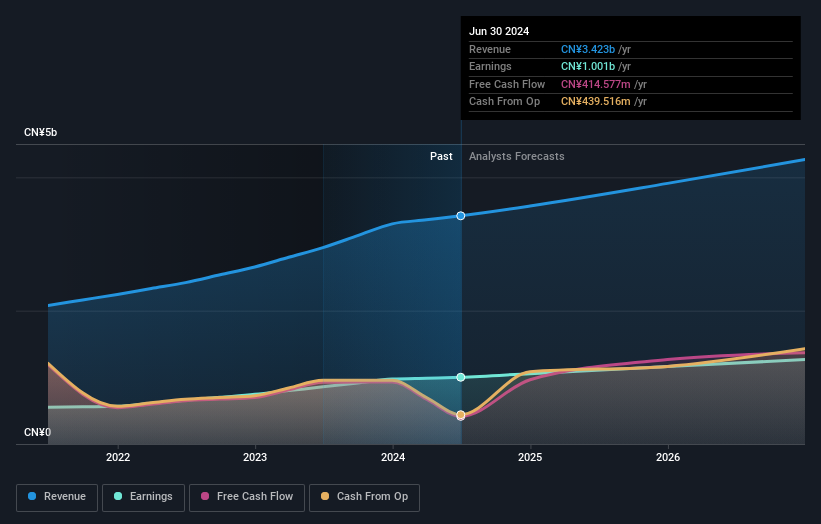Greentown Management Holdings Company Limited's (HKG:9979) largest shareholders are public companies who were rewarded as market cap surged HK$442m last week
Key Insights
- The considerable ownership by public companies in Greentown Management Holdings indicates that they collectively have a greater say in management and business strategy
- Greentown China Holdings Limited owns 71% of the company
- Recent purchases by insiders
A look at the shareholders of Greentown Management Holdings Company Limited (HKG:9979) can tell us which group is most powerful. With 71% stake, public companies possess the maximum shares in the company. In other words, the group stands to gain the most (or lose the most) from their investment into the company.
As a result, public companies were the biggest beneficiaries of last week’s 7.5% gain.
In the chart below, we zoom in on the different ownership groups of Greentown Management Holdings.
View our latest analysis for Greentown Management Holdings

What Does The Institutional Ownership Tell Us About Greentown Management Holdings?
Institutional investors commonly compare their own returns to the returns of a commonly followed index. So they generally do consider buying larger companies that are included in the relevant benchmark index.
We can see that Greentown Management Holdings does have institutional investors; and they hold a good portion of the company's stock. This suggests some credibility amongst professional investors. But we can't rely on that fact alone since institutions make bad investments sometimes, just like everyone does. If multiple institutions change their view on a stock at the same time, you could see the share price drop fast. It's therefore worth looking at Greentown Management Holdings' earnings history below. Of course, the future is what really matters.

We note that hedge funds don't have a meaningful investment in Greentown Management Holdings. Our data shows that Greentown China Holdings Limited is the largest shareholder with 71% of shares outstanding. This essentially means that they have extensive influence, if not outright control, over the future of the corporation. Ping An UOB Fund Management Co., Ltd. is the second largest shareholder owning 1.2% of common stock, and China Asset Management Co. Ltd. holds about 0.8% of the company stock.
While it makes sense to study institutional ownership data for a company, it also makes sense to study analyst sentiments to know which way the wind is blowing. There are plenty of analysts covering the stock, so it might be worth seeing what they are forecasting, too.
Insider Ownership Of Greentown Management Holdings
While the precise definition of an insider can be subjective, almost everyone considers board members to be insiders. Company management run the business, but the CEO will answer to the board, even if he or she is a member of it.
I generally consider insider ownership to be a good thing. However, on some occasions it makes it more difficult for other shareholders to hold the board accountable for decisions.
Our most recent data indicates that insiders own less than 1% of Greentown Management Holdings Company Limited. It appears that the board holds about HK$62m worth of stock. This compares to a market capitalization of HK$6.4b. We generally like to see a board more invested. However it might be worth checking if those insiders have been buying.
General Public Ownership
With a 22% ownership, the general public, mostly comprising of individual investors, have some degree of sway over Greentown Management Holdings. While this size of ownership may not be enough to sway a policy decision in their favour, they can still make a collective impact on company policies.
Public Company Ownership
We can see that public companies hold 71% of the Greentown Management Holdings shares on issue. This may be a strategic interest and the two companies may have related business interests. It could be that they have de-merged. This holding is probably worth investigating further.
Next Steps:
While it is well worth considering the different groups that own a company, there are other factors that are even more important. For example, we've discovered 2 warning signs for Greentown Management Holdings (1 is concerning!) that you should be aware of before investing here.
If you would prefer discover what analysts are predicting in terms of future growth, do not miss this free report on analyst forecasts.
NB: Figures in this article are calculated using data from the last twelve months, which refer to the 12-month period ending on the last date of the month the financial statement is dated. This may not be consistent with full year annual report figures.
Have feedback on this article? Concerned about the content? Get in touch with us directly. Alternatively, email editorial-team (at) simplywallst.com.
This article by Simply Wall St is general in nature. We provide commentary based on historical data and analyst forecasts only using an unbiased methodology and our articles are not intended to be financial advice. It does not constitute a recommendation to buy or sell any stock, and does not take account of your objectives, or your financial situation. We aim to bring you long-term focused analysis driven by fundamental data. Note that our analysis may not factor in the latest price-sensitive company announcements or qualitative material. Simply Wall St has no position in any stocks mentioned.
① During the campaign period, US stocks, US stocks short selling, US stock options, Hong Kong stocks, and A-shares trading will maintain at $0 commission, and no subscription/redemption fees for mutual fund transactions. $0 fee offer has a time limit, until further notice. For more information, please visit: https://www.webull.hk/pricing
② More than 40M Downloads Globally : data based on Webull Technologies Limited's internal statistics as of July 14, 2023.
③ Pre-market (4:00 AM - 9:30 AM ET) , after-hours (4:00 PM - 8:00 PM ET) .
Webull Securities Limited is licensed with the Securities and Futures Commission of Hong Kong (CE No. BNG700) for carrying out Type 1 License for Dealing in Securities, Type 2 License for Dealing in Futures Contracts and Type 4 License for Advising on Securities.

English